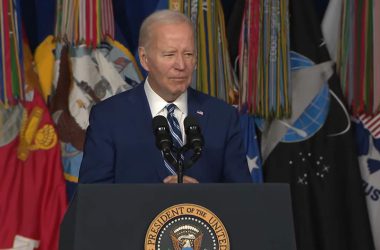Washington, DC–(ENEWSPF)–May 13, 2014.
REAR ADM. JOHN KIRBY: Just a few questions. They’re holding dinner, so we’re going to keep this moving right along.
SECRETARY OF DEFENSE CHUCK HAGEL: Okay. Good evening. We’ll have dinner soon. Drinks, too. First, let me make a couple of comments about why I’m doing this. I know you got a little brief prior to me coming out here, so you’ve got some sense from them more specifically, but — on what the point of the trip is.
But background is – some of you were with me in Manama when I suggested we have a GCC defense ministerial, and I suggested we try to accomplish that within a six-month period. I noted that at the time and suggested it, because I think as issues become more complicated, more connected, and every big challenge in the Middle East is not isolated to one country or one dimension of a challenge, but these are regional issues, and some go beyond regional challenges.
So the reason that I suggested this back in December is to try to develop a forum, an opportunity to advance regional partnerships, cooperation, strategy, more than maybe we have in the past. I think some of the specific points that should be included — and I said this at the time in Manama — and we’ll focus on these issues here in the next two days — but, one, to strengthen partnerships, strengthen U.S. regional GCC partnerships, because as I said, these challenges that face the region can’t be isolated just by country.
I think, second, we want to continue to reassure our partners here of U.S. commitment in this region. And I think the third main area of focus should be on reinforcing capabilities of our GCC partners, specifically cybersecurity, air and maritime security, missile defense.
These are all common threats. And the strength in these coalitions, like other collective security and different kinds of coalitions around the world, have shown that that collective security or coordination on working together against common threats is important.
Each country has its own dimension, dynamic, as it should be. But what I would hope we could achieve here would be to focus on those three areas. We’ll talk specifically about Iran, about Syria, because these are real issues, real challenges for this region. Then, as you know, I’ll stop in Jordan on the way out of Saudi Arabia, then be in Israel for a couple of days, but I think for the point of this exchange, John wanted to keep it somewhat focused on whatever’s topical today around the world, but also on the GCC conference. Okay?
I’ll take questions.
ADM. KIRBY: Questions? Bob?
Q: Mr. Secretary, you mentioned Syria, but if you could tell us what your thinking is in terms of the possibilities for the U.S. military to provide more types of assistance, deeper assistance to the rebel forces?
SEC. HAGEL: Well, I think all of you know the Syrian National Coalition is in Washington. Mr. Jarba met with some of my senior leaders at the Pentagon today. I think he met with Secretary Kerry, will meet with Ambassador Rice tomorrow. These are the kind of issues that will be discussed. We’ll continue to look for ways to strengthen our commitment to the moderate opposition. So we’ll talk about those issues tomorrow, as well as those issues being discussed in Washington this week.
Q: Thank you, Mr. Secretary. Nice shoes, may I say.
SEC. HAGEL: Thank you.
Q: On Syria, are you on track to get all the chemical weapons out by the deadline this summer? And in Iraq, have the Iraqis asked you for armed drones? And would you be open to giving them armed drones? Thank you.
SEC. HAGEL: Well, on the chemical weapons issue, you know that the bulk by our estimates that more than 90 percent of the chemical weapons are now out of Syria, still 8 percent to 10 percent located in Syria. The problem that we have is that there are security challenges to get those moved to the port and to get the last chemical weapons and the precursors onto the ship.
We’ll continue to do everything we can, as we are now, to accomplish that. This is not — this effort is not complete until we get all of it out, but it’s a security issue.
On your question regarding Iraq, I think as you know, we are assisting the Iraqi government on their request for advice. And we have a team assisting them on evaluating what additional assets we can provide. On drones, we’ve made no decision on providing drones.
Q: (off mic)
SEC. HAGEL: They’ve asked for many different assets.
ADM. KIRBY: Okay. Ernesto?
Q: Mr. Secretary, your remarks yesterday about transgendered people in the military caused a great amount of attention. I’m wondering, if you think that these medical conditions should be constantly evaluated, in light of recent developments, including the challenges posed by the Chelsea Manning case, the psychiatric revisions that happened last year, and the growing number of calls from independent experts, people outside the military for the military to actively review this issue, what’s stopping you from asking for a formal review, from saying — you know, from saying more than we’re open to constantly reviewing all health issues, but from tackling this issue specifically and in the near future?
SEC. HAGEL: The answer to the question is, first of all, as I said yesterday, I believe that all qualified individuals who want to serve their country in uniform should have an opportunity to do that. Now, as you have noted, I also said that this issue is different than past issues that we have dealt with on fulfilling that commitment, because there are certain medical dimensions to this issue that, as I said yesterday, we should continue to evaluate.
I’ve not asked for a specific task force. I’ve not asked for a specific study. I would want to hear more from individuals who are close to this issue, know this issue, who I would value their judgment and their direction on.
ADM. KIRBY: Okay, guys. I think we’re going to wrap it up right there. Thanks very much. I think they’re going to serve dinner here pretty soon. Thanks.
Source: defense.gov








